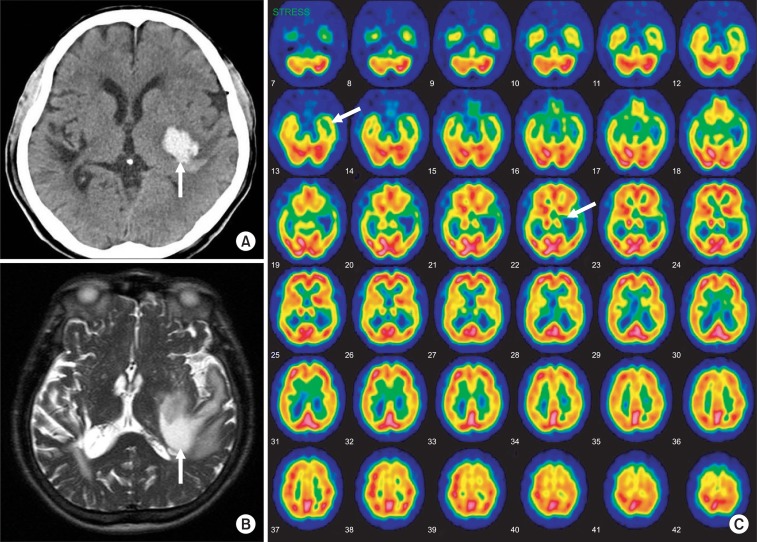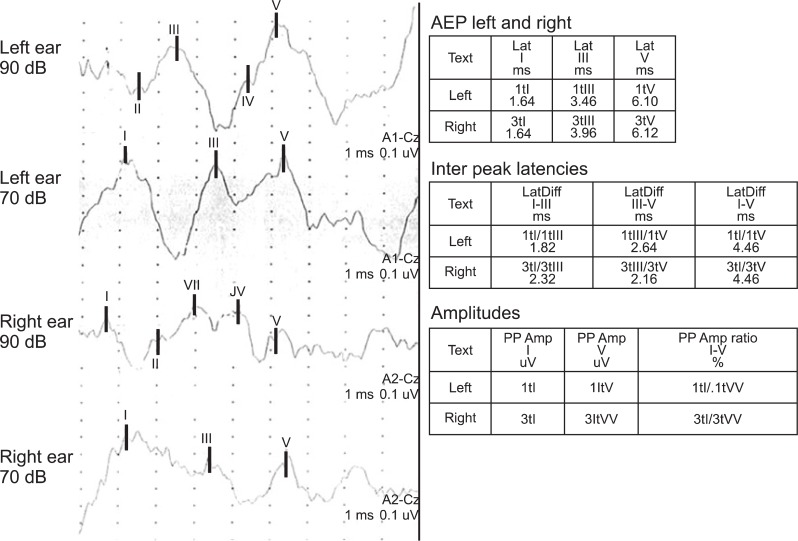Ann Rehabil Med.
2012 Dec;36(6):866-870.
A Case of Generalized Auditory Agnosia with Unilateral Subcortical Brain Lesion
- Affiliations
-
- 1Department of Rehabilitation Medicine, Pusan National University School of Medicine, Research Institute for Convergence of Biomedical Science and Technology, Pusan National University Yangsan Hospital, Yangsan 626-770, Korea. rmshin01@gmail.com
- 2Department of Speech & Language Therapy, Young Dong University, Chungbuk 370-701, Korea.
Abstract
- The mechanisms and functional anatomy underlying the early stages of speech perception are still not well understood. Auditory agnosia is a deficit of auditory object processing defined as a disability to recognize spoken languages and/or nonverbal environmental sounds and music despite adequate hearing while spontaneous speech, reading and writing are preserved. Usually, either the bilateral or unilateral temporal lobe, especially the transverse gyral lesions, are responsible for auditory agnosia. Subcortical lesions without cortical damage rarely causes auditory agnosia. We present a 73-year-old right-handed male with generalized auditory agnosia caused by a unilateral subcortical lesion. He was not able to repeat or dictate but to perform fluent and comprehensible speech. He could understand and read written words and phrases. His auditory brainstem evoked potential and audiometry were intact. This case suggested that the subcortical lesion involving unilateral acoustic radiation could cause generalized auditory agnosia.
MeSH Terms
Figure
Reference
-
1. Simons JS, Lambon Raiph MA. The auditory agnosias. Neurocase. 1999; 5:379–406.
Article2. Mendez MF, Geehan GR Jr. Cortical auditory disorders: clinical and psychoacoustic features. J Neurol Neurosurg Psychiatry. 1988; 51:1–9. PMID: 2450968.
Article3. Zatorre RJ, Evans AC, Meyer E, Gjedde A. Lateralization of phonetic and pitch discrimination in speech processing. Science. 1992; 256:846–849. PMID: 1589767.4. Zhang Q, Kaga K, Hayashi A. Auditory agnosia due to long-term severe hydrocephalus caused by spina bifida-specific auditory pathway versus nonspecific auditory pathway. Acta Otolaryngol. 2011; 131:787–792. PMID: 21413843.5. Clarke S, Bellmann A, De Ribaupierre F, Assal G. Non-verbal auditory recognition in normal subjects and brain-damaged patients: evidence for parallel processing. Neuropsychologia. 1996; 34:587–603. PMID: 8736571.
Article6. Slevc LR, Marin RC, Hamilton AC, Joanisse MF. Speech perception, rapid temporal processing, and the left hemisphere: a case study of unilateral pure word deafness. Neuropsychologia. 2011; 49:216–230. PMID: 21093464.
Article7. Kitayama I, Yamazaki K, Shibahara K, Nomura J. Pure word deafness with possible transfer of language dominance. Jpn J Psychiatry Neurol. 1990; 44:577–584. PMID: 2074617.
Article8. Guyton AC, Hall JE. Textbook of medical physiology. 2000. 10th ed. Philadephia: WB Saunders;p. 608–609.
- Full Text Links
- Actions
-
Cited
- CITED
-
- Close
- Share
- Similar articles
-
- Generalized auditory agnosia: A case with bilateral subcortical lesions
- Verbal Auditory Agnosia Developed after Unilateral Temporal Lobe Infarction
- Two Cases of the Landau-Kleffner Syndrome
- Auditory Brainstem Evoked Potential Responses in Focal Brain Lesions
- Unilateral Asterixis Induced by Antiepileptic Drugs in Epileptic Patients with Structural Brain Lesion




